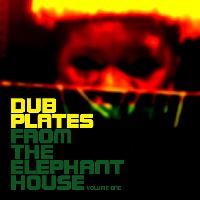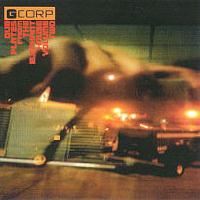Groove Corporation's second album for Different Drummer "Dub
Plates From The Elephant House Vol. 2" not only seamlessly
carries on from "Dub Plates From The Elephant House Vol.
1", it is also the latest in a seemingly endless flow of
truly excellent releases. It seems like only yesterday that
their "Remixes From The Elephant House" exploded on
the scene like an exocet missile, that their crucial contribution
to Overproof Soundsystem's "Watch What You Put Inna"
had folk licking dancehall wood, that their remix of Big Youth's
"Waterhouse Rock" was one of the best remixes on "Select
Cuts from Blood & Fire Vol. 3", and that the "Dry
Bone" remix was released on Green Tea. With such an impressive
deluge it's more than likely that I've forgotten some. But with
productivity like this, how's a guy to keep track of every tracků
Irie Ites spoke to Brian Nordhoff about the new album.
Let's
start right there: how do you manage to be so unbelievably creative
and productive without the quality suffering in any way? What
are your aids, relaxation methods, muses of choice?
To be honest nothing is planned at
the elephant house it is more like a receiver transmitter situation,
by that I mean the more open we make ourselves the more we are
free of pre conceptions and musical restrictions it seems the
more idea's come rushing in. As for aids, our independence is
an aid. Not having to write for anyone else. Oh and the bag
of skunk leafs probably has some thing to do with it.
The opener on your album, "Clever Kid", makes liberal
use of dancehall beats. The Different Drummer version of "Watch
What You Put Inna" by Overproof Soundsystem - where you
were heavily involved - has a similar sound. Is it time to start
talking about a new direction in dub? Dancehall dub?
We don't see this as a new direction
we see it as all part of the same direction it is just something
that came out one day. I am sure more of that will come out,
especially as we spend more time in Germany. In England the
dance hall scene is a bit moody, to much violence but the good
vibes in Germany have helped us get closer to the form.
On "Liberation Dub" you got Jamaican vocalist Bobby
Blue in front of the mic and produced a first-rate Steppers-style
track. Bobby Blue is also on Rootsman's "New Testament".
He appears to pretty popular just now - at least in the UK.
What do you particularly like about Bobby Blue?
Bobby has one of those classic reggae
vocals like Luciano or Dennis Brown full of life full of soul.
Which artists would you like to work with in the future?
Do musicians as successful as G-Corp still have dreams?
We love working with other people.
There are endless amounts of people known and unknown we would
love to work with. For us it is anyone who can project an essence,
who can touch a soul. One in particular would be Yabby You but
unfortunately he is too ill to travel. As for dreams every time
we walk in the elephant house we dream, we dream of making the
perfect medicine, something to uplift our spirit and soul, that
would then hopefully do the same for someone else hearing it.
Let's
get on to your excellent remixes: in the past you've tackled
real reggae classics, like "Cocaine In My Brain",
and have dressed them in new clothes. Was there a sense of being
paralysed by respect for these great tracks before getting started?
We always have respect for the song
and who ever is singing it, but we are never paralysed by it.
In fact it is the opposite when you push up a fader on the mixing
board and find Bob Marley you tend to jump round the room like
a small child on his birthday.
With
so many truly superfluous remixes, yours come as a sheer relief.
What is your secret recipe for a good remix?
To trust in your soul and let what
ever happen's happen. We never mix to a brief we can only do
what we do not what someone thinks we can do.
On the 1995 album "Co-Operation" dub seemed to
take a back seat to all the other dance influences. Was this
a concession to Sony and with it to the mainstream?
Not at all, in fact the album was written
before Sony got involved but it was never intended as a dub
lp it was more about show casing some very talented friends.
It was more about the songs, we wrote whatever we thought each
song needed. I think some of the dance elements were natural
as we had just come out of the electribe 101 situation and were
still quite influenced by dance music. You have to remember
that back in 1989 dance music was closer to dub. It was about
breaking rules and experimenting although now I feel it has
become the antithesis of it self - totally formularised. We
are about to release a similar kind of lp to co-operation for
Guidance recordings in the States with vocals from a lot of
different people, although because of where we are at now this
is probably more dub influenced when you look behind the songs.
What
projects have you got in the pipeline?
1. A mainly vocal; LP for Guidance
recordings
2. The overproof sound system LP
3. Some tunes with a new vocalist called Sledgehammer
4. Remix's for Thievery Corporation and emo
5. An Lp for a poet and a soul diva known as Speaker People
6. More dub along the way.
Interview:
Karsten Frehe (10/2002)
Foto:
dot head couler by G.Corp
Check
the Irie Ites Interview (audiofile) with
MC
Tweed (Rockers Hi-Fi) and Jah Grizzly (G-Corp) of the Overproof
Soundsystem
For
more Information check: Different
Drummer
  |
"Dub
Plates From The Elephant House Vol. 1" und das neue
Album "Dub Plates From The Elephant House Vol. 2"
sind bei Different Drummer erschienen und werden über
EFA vertrieben. |
Hier
findet ihr eine Auswahl von bereits bei Irie Ites besprochenen
Veröffentlichungen der Groove Corporation (bzw. von
Compilations mit deren Beteiligung). Ein Klick auf das entsprechende
Cover bringt euch zu der jeweiligen Rezension.
|
|
|